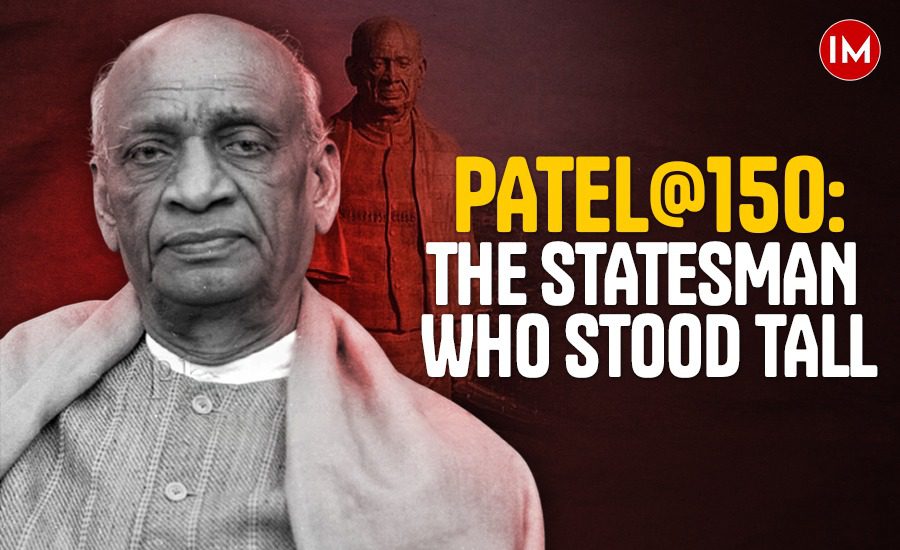As the nation prepares to celebrate National Unity Day on 31st October to mark the birth anniversary of Sardar Patel, it is important to reflect on the many landmark decisions made by him at one of the most critical junctures of India’s history. Most people are aware of his insistence on statutory provisions to ensure the integrity and impartiality of the civil services by the insertion of Articles 311 to 314 in the Constitution, as well as the determined action to integrate all 562 princely states within the Indian Union in record time, thereby ensuring the smooth transition from the Dominion of India to the Republic of Bharat.
Many are also aware that both Junagadh and Hyderabad fell in line only because he did not hesitate to back his diktat with the power of the uniformed forces. Less is known about the fact that it was his plain speaking with the Maharaja of Jodhpur, which ensured that the latter did not consider Jinnah’s ‘blank cheque’ offer for joining Pakistan. Jinnah offered three temptations – first, that Rajputs will be exempt from provisions of arms licensing, that land ceiling laws will not be applicable in Jodhpur and that the Maharaja will exercise complete jurisdiction over revenue, civil and criminal matters within his territory. This has to be seen in the context of the Congress narrative on land reform legislation and popular representation.
It is now widely agreed that had his timely advice on J&K been accepted, India would have been in actual possession of all the territories of the erstwhile Riyasat-e-Jammu-wa-Kashmir-wa-Ladakh-wa-Tibet Ha (the official name of J&K). However, that was not to be, and this northern border has remained unsettled from the time of accession of J&K to India.
Fortunately for us, with respect to the Northeast border, prompt action was taken by his acolyte Jairamdas Daulatram, who, as the Governor of Assam, also had a special responsibility for the North Eastern Frontier Agency (Arunachal Pradesh). Just a week before his death on 15th December 1950, Daulatram received a copy of Patel’s letter to Nehru about the grave apprehensions on Chinese expansionism, ‘almost up to our gates’. The letter read, ‘Throughout history, we have seldom been worried about our northeast frontier. The Himalayas had been regarded as an impenetrable barrier against any threat from the north. We had a friendly Tibet which gave us no trouble…. Therefore, the undefined state of the frontier and the existence on our side of a population with its affinities to Tibetans or Chinese have all the elements of potential trouble between China and ourselves. In a prescient comment, he said, ‘Recent and bitter history also tells us that Communism is no shield against imperialism and that the Chinese Communists are as good or as bad imperialists as any other.’ Thus, for the first time, after centuries, India’s defence has to concentrate itself on two fronts simultaneously. In fact, as later events would show, China and Pakistan have often teamed up against India
In this letter under reference, he wanted Nehru to take immediate and prompt action on
a) the political and administrative steps which we should take to strengthen our northern and northeastern frontiers. This would include the whole of the border, i.e., Nepal, Bhutan, Sikkim, Darjeeling and the Tribal territory in Assam.
(b) measures of internal security in the border areas as well as the states flanking those areas, such as UP, Bihar, Bengal and Assam.
c) Improvement of our communications, road, rail, air and wireless in these areas, and with the frontier outposts.
d) Policing and intelligence of frontier posts.
e) The future of our mission at Lhasa and the trade posts at Gyantse and Yatung, and the forces which we have in operation in Tibet to guard the trade routes.
f) The policy regarding the McMahon Line.
Even before the MHA sent any directive to the government of Assam, Jairamdas Daulatram took the initiative into his own hands. He summoned Major Ronaldo (Bob) Khathing of the Assam Rifles, who had earlier made a name for himself in the rehabilitation work post the January 1950 earthquake, to secure the NEFA frontier by taking physical possession of Tawang as per the 1914 map drawn in Simla – known in popular parlance as the McMahon Line.
Khathing set out with 200 troops from the Kumaon regiments and eight hundred porters and mules to establish India’s authority on the Tawang monastery. Thus it was that on 9 February 1951 (the third day of the year of the Vulture), Khathing reached Tawang and announced that henceforth the lamas had to offer their allegiance to India. There was little resistance, for the local population was suffering on account of the high tax rates that were being charged by an impoverished people whose livelihoods had been affected by the long period of warfare. Had Patel lived longer, India may not have conceded the consulate at Lhasa and the Indian military garrisons at Gyantse and Yatung, for after his death, our foreign policy took an ideological, rather than ‘nation-first’, approach. Not only did we accept the Chinese view of suzerainty over Tibet, but we also supported China’s membership of the UN, which in later years proved to be the albatross around our neck.
Therefore, as we bow our heads to pay our tribute to the Sardar, it is also important to note that his understanding of foreign policy was far more prescient than that of his contemporaries on the Indian political firmament.

































